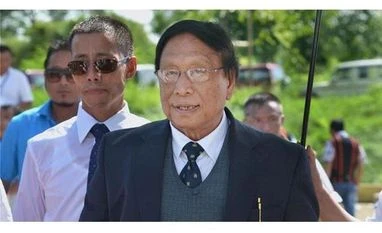NSCN-IM General Secretary Thuingaleng Muivah on Monday asserted that the separate flag and constitution for the Nagas, contentious issues that have stalled the peace process, are inseparable from the sovereignty of the people.
The Framework Agreement signed between the Centre and the National Socialist Council of Nagalim (Isak-Muivah) to bring lasting peace in Nagaland was inked in 2015 recognising the unique history and sovereignty of the Nagas, Muivah said.
We must defend what we have achieved with our own sweat and blood. On the issue of integration of all Naga areas, the government of India has officially acknowledged that it is the legitimate right of the Nagas and therefore, it shall be finalised accordingly, he said.
Muivah was speaking on the occasion of the NSCN-IM's independence day' celebration at its headquarters in Hebron, 30 km from Nagaland's commercial hub of Dimapur.
The Naga national resistance movement is all about defending the inherent sovereign right of the Nagas and their land. ... (The NSCN-IM) signed the historic Framework Agreement on August 3, 2015, on the foundation of recognition of the unique history and sovereignty of the Nagas, and shared sovereignty and coexistence of the two entities, he said.
The framework agreement was signed on August 3, 2015, by Muivah and government interlocutor for Naga peace talks R N Ravi in presence of Prime Minister Narendra Modi.
The pact came after over 80 rounds of negotiations spanning 18 years, with the first breakthrough in 1997 when the ceasefire agreement was sealed after decades of insurgency in Nagaland which started soon after Independence in 1947.
Also Read
However, the final solution is yet to see the light of the day mainly because of the unwillingness of the government to accept the NSCN(IM)'s persistent demand for a separate flag and constitution.
Muivah in his speech during the day said, It is a universally accepted truth that flag and constitution are constituent parts of sovereignty. There is no ambiguity about it.
The Centre is not willing to accept the demands apparently because it had abrogated Article 370 which gave a special status to Jammu and Kashmir. With the annulment of the special status in 2019, the separate flag and the Constitution of Jammu and Kashmir cease to exist.
Besides the framework agreement with the NSCN(IM), the Centre also inked an Agreed Position with Naga National Political Groups (NNPGs) comprising seven organisations (NNPGs) in December 2017.
He said Nagas are proud of their past dynamic leaders who decided in declaring the Naga National Independence on August 14, 1947, on the eve of the departure of the British from colonial India.
It was a historic step that gave a new meaning to the Naga National identity and saved the future of the Nagas, he said.
A number of Naga people from various states also came to Kohima to take part in the independence day' programme.
(Only the headline and picture of this report may have been reworked by the Business Standard staff; the rest of the content is auto-generated from a syndicated feed.)
)